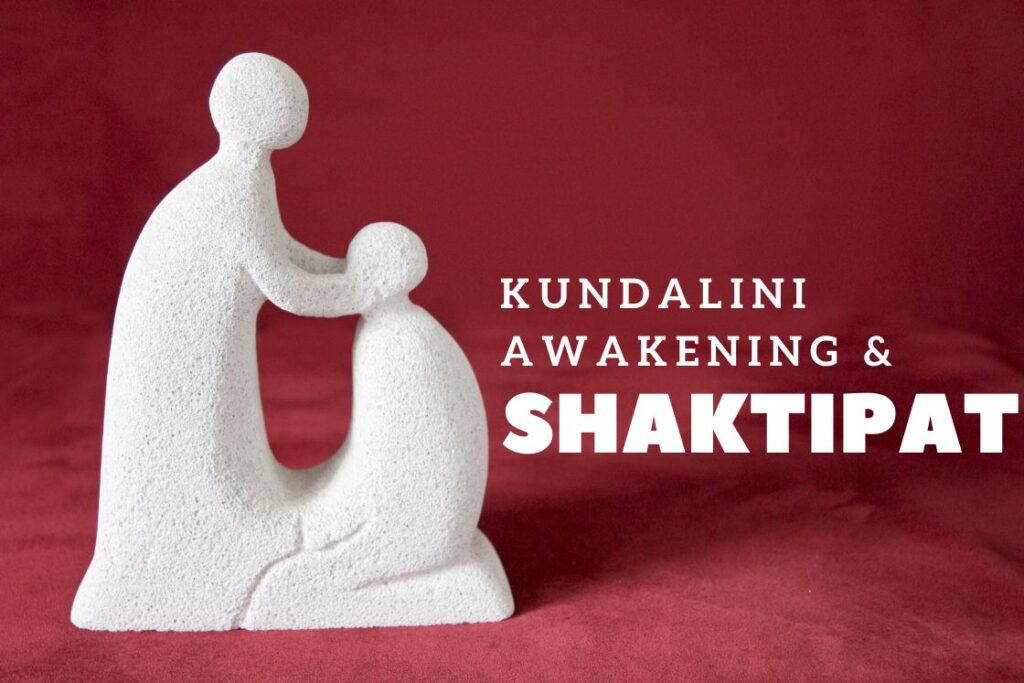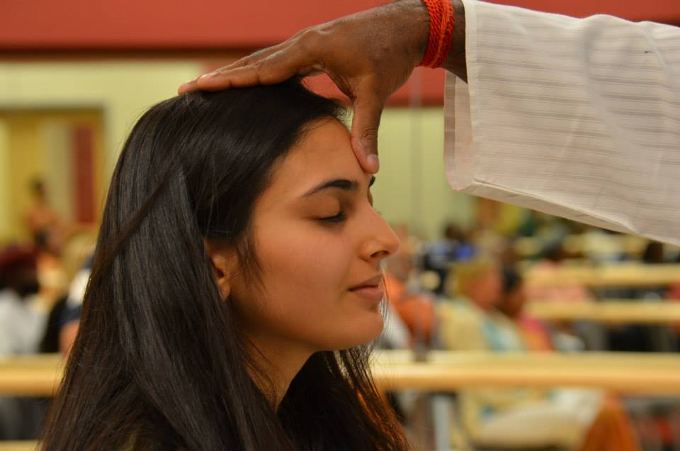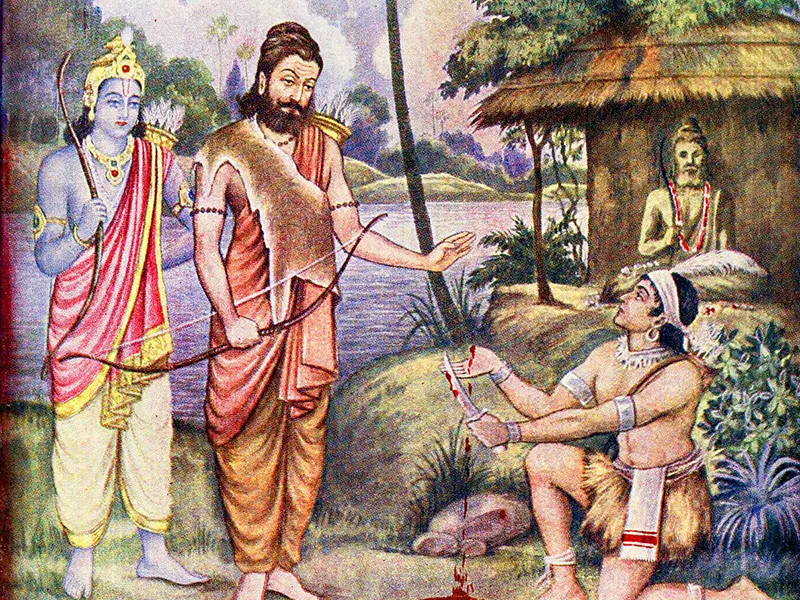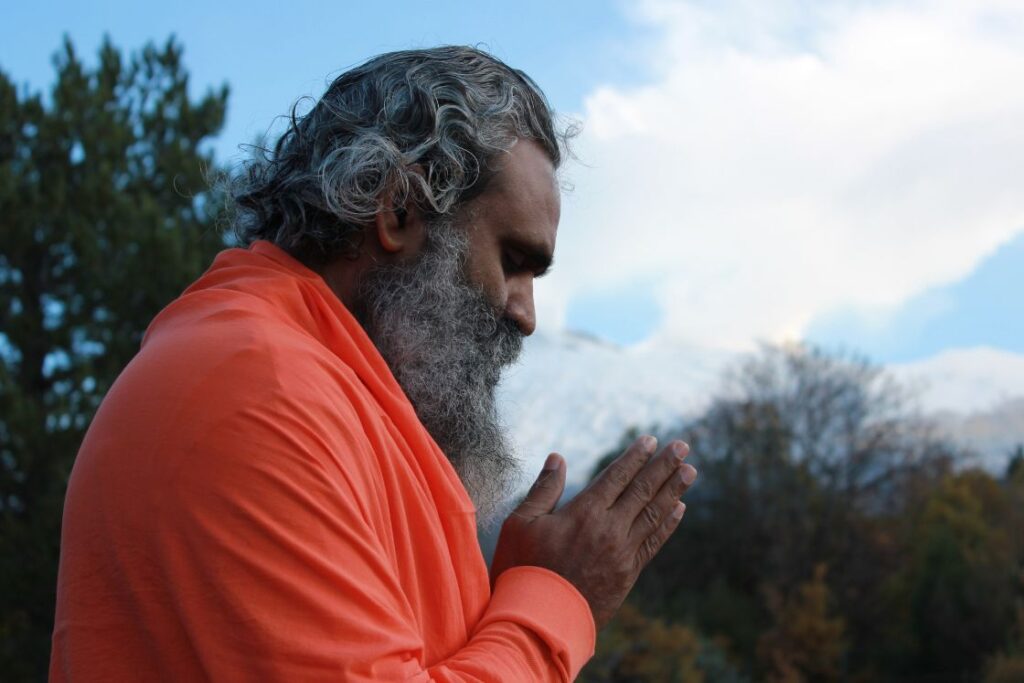- Shaktipat Meaning
- Shaktipat Initiation
- How does it work?
- After Shaktipat
- Shaktipat and kundalini awakening
- Finding a guru

Once upon a time in ancient India, there lived a young seeker who was searching for a deeper connection to the divine. He had studied with many wise teachers and practiced various spiritual disciplines, yet still felt that something was missing. One day, he heard of a powerful spiritual master, said to possess the ability to awaken the dormant spiritual potential within others through a practice known as Shaktipat.
Intrigued, the young seeker made the journey to meet this master, who agreed to transmit his spiritual energy to the seeker through Shaktipat. As the master placed his hands on the seeker’s head, the seeker felt a surge of energy coursing through his body, and he was suddenly overcome by a wave of intense emotions and vivid visions. When the experience passed, the seeker felt transformed, as if a veil had been lifted from his eyes, allowing him to see the world with a new level of understanding.
From that moment on, the young seeker was a changed person, filled with a deep sense of peace and joy. He felt that the spiritual energy transmitted by the master had awakened the kundalini, a powerful energy force within him, and that he now had a greater connection to the divine. This is the concept of Shaktipat, the transfer of spiritual energy from one person to another, and it is considered by many to be a transformative experience that can lead to greater spiritual awareness and a more fulfilling life.
In this article, we will explore what Shaktipat means, its connection to the kundalini awakening, and whether it can truly help in awakening the kundalini. We will also discuss how to practice shaktipat, including tips for finding a qualified teacher and preparing for the experience.
What does Shaktipat mean?
Shaktipat combines two words: ‘shakti,’ meaning energy, and ‘pat,’ meaning descent. It is a tantric technique in which the energy of the cosmos is directly transferred to a disciple by their guru or master.
This technique is highly revered in the spiritual world. Shaktipat is considered the highest of all yogic techniques and is sometimes referred to as the “mother of yogic techniques.”
Shaktipat can only occur when a disciple is truly connected to their guru with complete loyalty and surrender.
It may only be attained after a lengthy time of self-discipline and spiritual inquiry. The giver must erase the imperceptible barriers standing in the disciple’s way of enlightenment for them to be capable of receiving it.
Without engaging in any spiritual practice, a student who receives Shaktipat will have divine insights in the space of a split second and experience bliss.
Anyone receptive to it can catch this energy and receive the Shaktipat. Depending on their openness and eligibility, it helps to erase the receivers’ profound karmic imprints and aids in their spiritual ascent.
You will become more aware of who you truly are at your core—the loving being that you are—as the pranic Spirit moves through you.
What is Shaktipat Initiation?

The act of performing Shaktipat by a guru is known as Shaktipat initiation or Shaktipat Diksha. This initiation begins the transformation process through self-healing, leading to a higher state of internal awareness and, ultimately, to higher consciousness.
Shaktipat initiation is performed by a guru in one of the following ways:
- Touch or Sparsha Diksha– The guru touches the seeker – on the third eye chakra, heart center, or base of the spine – to transmit the energy
- Divine mantra or word – The guru gives the seeker a divine mantra or word to be chanted. This mantra or word has been charged by cosmic power as the guru has been chanting this word or mantra for a long time. The mantra or word is sacred and unique and shouldn’t be disclosed in public by either the guru or disciple.
- Gaze or sight or Chaksushi Diksha – Through a mere compassionate sight of the guru, the seeker may go through shaktipat initiation.
- Thought or Manasi Diksha – When shaktipat initiation is done through thoughts. It is most suitable for guru-disciple when they are living in different parts of the world.
An example of Shaktipat initiation

One of the rarer and hardest forms of shaktipat initiation is through the seeker’s resolve. Here no initiation is needed from a guru. The seeker makes a resolve or Sankalp to be initiated by a guru of his choice.
Since the Sankalp is the highest form of loyalty and devotion of a disciple, the guru, who is considered an embodiment of cosmic divine consciousness, is compelled to respond to the Sankalp of the seeker.
One of the best examples of this form of Shaktipat initiation is the story of Eklavya from the famous Hindu text Mahabharat. He made a Sankalp of being taught and trained in archery by Guru Dronacharya by making an idol. He was ultimately initiated by Dronacharya, who was unaware of this resolve and went on to become a legendary archer.
Nirvana diksha and mritoddhari diksha, are a couple of other forms of shaktipat initiation. In the former, the guru burns all the karma of the seeker in an instant, providing them with liberation or nirvana. In the latter, the initiation is done after death.
These are highly advanced forms of initiation and are extremely rare.
An important point to remember here is that the guru will know when shaktipat initiation is needed. It is never done by force. Moreover, shaktipat initiation is only potent when the guru who is initiating shaktipat must have received it from a master.
It is also probable that the guru will use shaktipat at a highly advanced level of teaching when a disciple is practising yoga for spiritual objectives to enhance and enrich the student’s knowledge.
How does Shaktipat initiation work?

For shaktipat initiation, the guru and seeker must be well prepared mentally.
The guru must ask questions to the seeker to understand their readiness and receptibility. If the seeker is not ready, there will be no point in proceeding with the shaktipat initiation.
If the initiation is being performed from a distance, the guru and disciple should be well acquainted and should set up a date and time. The communication should be constant and both should be well informed of any delays.
If the shaktipat initiation is being performed in the physical presence, it is recommended that the disciple stays with the guru for at least 3 consecutive days.
In both cases, the seeker should be well prepared mentally to sit for long hours. They can bring a water bottle, a few snacks, a blanket, or a cushion to be as comfortable as possible.
Any expectations from the shaktipat initiation process should also be left behind before coming for the ritual. The disciple should remain calm and surrender wholly to the guru and the divine. Whatever they experience during the process of the shaktipat initiation, should be felt and not be pondered upon.
Generally, the initiation should be performed in the early morning or anytime between 4 am to 10 am on empty stomach. However, initiations can also be done in the evening or night if morning is not a feasible time.
What happens after shaktipat?
When you are given shaktipat initiation, the energy gets transmitted to the Muladhara chakra.
When shaktipat takes place, it awakens a person’s dormant spiritual energy (kundalini) by descending through the guru. The Sushumna Nadi is where this awakened spiritual force ascends. It ascends to the highest chakra, the Sahasrara, located at the crown of the head.
Before receiving shaktipat, the majority of those who obtain it are dedicated to their practice; subsequently, they typically return to it with newfound fervor and conviction.
Additionally, the guru and disciple should be linked – mentally and spiritually – for the shaktipat initiation to be successful.
Subsequently, when a person is initiated, they should follow it up with meditation and yogic practices to further manifest the kundalini awakening. The shakti that has been transmitted from the guru to the seeker will promote purification and transformation within the seeker.
This may also lead to bouts of bodily movements, emotional and behavioral shifts, or physical or mental pains.
It is also recommended that newly initiated disciples should avoid going out in public as the energy may unknowingly get transmigrated to non-initiates, resulting in hospitalization.
Does shaktipat help in kundalini awakening?

As stated above, shaktipat initiation has the power to awaken the kundalini energy from its dormancy as well. It will not give you the full experience of kundalini awakening but acts as a nudge for the kundalini to rise.
The best and most organic way to stir kundalini energy in the shortest time is said to be through shaktipat.
Kundalini energy is maintained at a safe range when Shaktipat is performed on a person whose kundalini energy was already strong at birth. Kundalini energy will get awakened for the first time in those who have not yet experienced it.
Finding a guru for Shaktipat
It is important to note that shaktipat initiation will only be possible when the time is ready. Your karma here plays an important role. Your past or present karmas will propel you toward shaktipat.
The search for a guru is also an important factor to be considered.
Finding a guru who has received shaktipat is truly a difficult task. There are high chances you may not find a guru with whom you may connect fully. It is important to trust your instincts and choose a teacher who resonates with you and with whom you feel comfortable. Shaktipat is a personal and intimate experience, and it is important to work with a teacher who you trust and who will respect your boundaries and needs. On the contrary, there are likely chances that you might stumble upon a highly enlightened guru when you least expect it and receive the shaktipat initiation.
Shaktipat continues in effect until salvation is reached. In their afterlives, Shaktipat is therefore continued. But it is necessary to receive formal Shaktipat initiation from a Guru once in a lifetime.
Thus, there is no clear answer to whether shaktipat is dangerous. It all depends on your karma and your preparedness and willingness to be initiated.
Conclusion
Due to the complete uncertainty of the call and timeline of the ritual, shaktipat is not an extremely popular technique among spiritual seekers. It is difficult to find a guru who is truly blessed with shaktipat and has been given the responsibility to perform this sacred ritual. However, if you are fortunate enough, shaktipat can be a truly wonderful experience and can take you forward on your path to enlightenment.




 Oct 24th to 30th
Oct 24th to 30th Learn Mudras
Learn Mudras  Deepen Your Practice
Deepen Your Practice  Find Inner Peace
Find Inner Peace